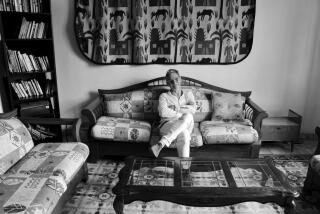Rigoberta Menchu
- Share via
* I was stunned in reading your defense of Rigoberta Menchu’s elaborate tale of lies in her “autobiography” (editorial, Dec. 25). You collapse on the comfortable couch of political correctness when you describe her acts as “the embroidery of Menchu’s words” and describe her as a “frail witness burdened by ideological zeal.” The facts of this ruse are otherwise.
Menchu had a boarding school education. Her Marxist rhetoric doesn’t sound like that of a Guatemalan peasant. What is her reaction to all of this? She denounces the discovery of her lies as a racist plot! And, of course, she will keep her Nobel Peace Prize.
None of this denies the un-imaginable history of cruelty in her country and the fact that her own parents died in a civil war. But her cynical and fabricated account brings shame to their sacrifice and to your alleged editorial balance.
TOM STEFFANCI
San Marino
*
I would not dare to pass judgment on Menchu’s account of the Guatemalan army’s atrocities against the Mayan people. Fabrications aside, no one doubts the horror and oppression she and her family experienced. However, as a progressive, I take issue with Alex Cockburn’s partisan position on the question of her book’s veracity (Commentary, Dec. 27).
First, no one needs to embellish the genocidal behavior on the part of the Guatemalan government and army; there are plenty of genuine human rights violations to convict them in the eyes of the world. But most important, the truth is always stronger than allegations.
Every day I receive e-mails from organizations whose names I don’t recognize, denouncing governments and transnational companies for a variety of atrocities. Since we all know that such actions do take place, does it matter which are true and which are not? It most certainly does. Every time a well-meaning nongovernmental organization wrongly denounces a company, government or factory, it diminishes the credibility of those NGOs that expend significant resources and time to check the truthfulness of allegations.
JUDI A. KESSLER
Department of Sociology
UC Santa Barbara
More to Read
Sign up for our Book Club newsletter
Get the latest news, events and more from the Los Angeles Times Book Club, and help us get L.A. reading and talking.
You may occasionally receive promotional content from the Los Angeles Times.






